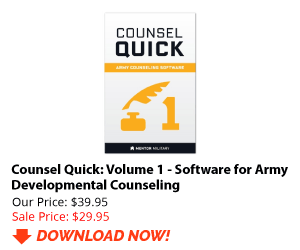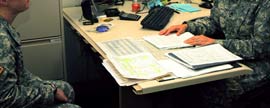Adultery is a crime punishable under Article 134, UCMJ. There are three elements that must be met to prove adultery existed. They are:
(1) That the accused wrongfully had sexual intercourse with a certain person;
(2) That, at the time, the accused or the other person was married to someone else; and
(3) That, under the circumstances, the conduct of the accused was to the prejudice of good order and discipline in the armed forces or was of a nature to bring discredit upon the armed forces.
The first element is the hardest to prove. The reason being is that the physical act of intercourse has to be proven. Unless there is a video, credible witnesses of the couple in the act, or some other concrete evidence, a confession by one of the two parties is normally the only way to prove adultery. This does happen on occasion, but normally neither party will confess.
The second element is that the offending Soldier is either married or he/she knows the other person was married. If the Soldier legitimately did not know the other person was married, then adultery did not occur.
The third element is the easiest of the three. The Commander has to determine that the conduct was prejudicial to good order and discipline. The fact that the Soldier was having an affair with another Soldier’s spouse meets that criteria if it is known by other Soldiers in the unit.
Even if intercourse can not be proven, then there are other actions that can be taken. The Soldier who’s wife is having the affair can approach the command with their concerns. If the 1SG/Commander determine their concerns are legitimate, then the commander can counsel the offending Soldier on inappropriate relationships and give the Soldier a no-contact order for the other Soldier’s spouse. Should the offending Soldier violate the no-contact order that Soldier can be punished under Article 90, UCMJ for willfully disobeying a superior commissioned officer.
In any event, if the offending Soldier is spoken to about the situation, who ever counsels him/her should ensure the Soldier’s rights are not violated and he/she is read their rights using DA Form 3881, Right Advisement. If this step is skipped, any information/confession the Soldier may provide could be thrown out as evidence for UCMJ or courts-martial proceedings.
I hope you found this information useful.
“The views presented by the author are his own and do not necessarily represent the views of the DoD or its Components.”
Disclaimer: I am not an attorney and any views presented are my own and are not to be
interpreted as legal advice. Furthermore, my views do not necessarily
represent the views of DoD or its Components.













Comments
Michelle
How does a civilian have charges filed against a military individual for having an affair with the civilians spouse and being the cause of a pending divorce?
Anonymous
My case is the next I’m married to a military 12 years ago and 19 years together.The total SSG is active in the AGR program. The I was unfaithful and also the pregnancy, she is currently married to an American citizen and she is requesting a green card, claiming to be a victim of domestic violence that was who accused its current husband.What steps I shoug follow if I want to accuse of adultery in the ARMY and set out the rights and have a wife
Anonymous
I have been seeing a cw2 for over 2 yrs when I met him he said he was getting a divorce. Well turns out a few weeks ago I found out that he wasnt only seeing me but another woman and there was no divorce until about 8 mos ago when his wife found out he was cheating with the other woman on top of he claimed she was taking all his money and couldn’t afford to eat, gas or pay bills. So I helped him with these things as well as the other woman. Along with his 5400 his wife wasn’t taking from him. What could happen to him
Mark Gerecht
Anonymous,
If Adultery can be proven. He can be prosecuted under UCMJ for adultery. I believe the maximum sentence for Adultery is 2 years confinement. Typically, for adultery to be proven one of the individuals must admit to the incident and/or physical proof must be provided meaning photos, video, or witness.
Hope this Helps
TOP
Anonymous
What if a PFC and a civilian was to be doing something and she didn’t know he had a wife but also only have one picture of them kissing and that his wife had became pregnant within 2 months of him and the other female have been talking. But the wife was the one who spoke to a investigator first saying that he was in a relationship first?
Anonymous
What if it was a civilian and an nco ? What is the difference ? If the nco confesses to adultery or pleads guilty , what do you think his possible punishments would be ?
Eck
The NCO could face anything from a verbal reprimand to a courts-martial. It all depends upon the chain of command and the circumstances. If the NCO was married and having an affair vs. the NCO being single and having an affair with a civilian who was married; then the command may look at the situation differently. The level of punishment is dependent upon the level of action taken by the NCO’s command.
I realize this does not give a clear answer, but it is entirely up to the command and how they perceive the circumstances surrounding the adultery.
Mark Gerecht
I have to agree with Doug. For example if the NCO did not know the other person was married then most likely there would be little to no issue. If on the other hand the NCO had knowledge he is guilty. The question becomes to what degree. This is based on knowledge, circumstances, even the NCO’s reputation and integrity, but more importantly it comes down to what the chain of command can prove. Now if they cannot prove adultery (which is difficult for the most part) the chain of command may find some other infractions to take action on for example: disobeying an order, perception of inappropriate relationship,violation of good order and discipline. All of these cases are based on the facts that can be proven and the individual circumstances of the specific situation. Rarely are these cases cut and dry unless one party admits to adultery, photos or video are provided, etc. I am not trying to be judgmental but the Bottom line is Leaders/Soldiers know better. This conduct is inappropriate and destroys trust between members of the chain of command and the Soldier in question. It does not matter if the adultery occurred with another Soldier, a Soldier’s spouse, or a civilian.
TOP
Eck
Ms. Noelle,
I believe when you state UCMJ punishment, you are actually referring to nonjudicial punishment under Article 15 of the UCMJ.
UCMJ stands for “Uniform Code of Military Justice”, which consists of 141 Articles, that govern everything from how nonjudicial punishment (Article 15 procedures) is handled to the composition and handling of courts-martial cases.
A letter of admonishment is an administrative measure that is separate from non-judicial punishment. A letter of admonishment, filed locally, will be retained in the Soldier’s local file for a period of time, not to exceed 3 years, then destroyed. This is a basic administrative tool to get the Soldier’s attention and record the misconduct in writing.
Even if the letter of admonishment was filed locally, it does not mean the Soldier will not see negative consequences for their actions, especially if the Soldier is an Officer or NCO. Most commands do not take lightly having to send a Soldier back from deployment early because of misconduct. Most likely, if the Soldier is an Officer or NCO, this misconduct was mentioned in their evaluation report (OER or NCOER)that is reviewed for future assignments and promotions at Department of the Army level.
This may or may not be the case to the situation your referenced. My comments are just an example of what MAY have occurred.
I hope you found this useful.
Eck
“I am not an attorney and any views presented are my own and are not to be interpreted as legal advice. Furthermore, my views do not necessarily represent the views of DoD or its Components.”
Ms. Noelle
My question is this: What is considered UCMJ punishment? Does a letter of admonishment filed locally inthe Soldier’s constitute UCMJ? The Soldier admitted to having an affair and was returned from deployment to handle his affair with his spouse. No other action was taken.
SGT NICK
Also some people are able to divorce and marry the other person in time so they both do not have to testify against each other. Another difficult reason to enforce this policy is when the two Soldiers, persons, or co-conspirators are in different chain of commands. There is always one that will either defend their Soldier, drag feet in the investigation, or not cooperate altogether.
Part-Time-Commander
Great articles for military leaders and Soldiers to read. The bottom line is stay faithful to your spouse! As a leader, make sure you inform yourself about what questions you can and can’t ask and the right way to do it.
Chuck